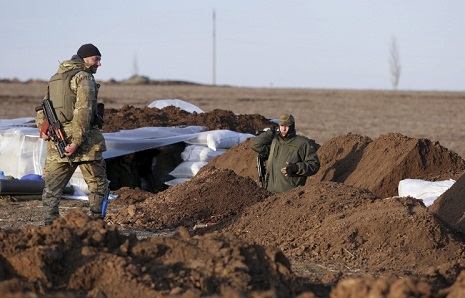"They will speak at an online conference and then we will hold a session behind closed doors," the diplomat said adding Great Britain and France initiated the meeting but also he put into question the urgency of such a meeting.
"I believe it will be a waste of time," he said. "The initiators are Great Britain and France, they have ambassadors at the OSCE and so it is unclear what they want."
"I think people should have been granted a possibility to work calmly," Churkin said. "It would have been a different matter if Africans have requested this briefing or some others who do not participate in the OSCE."
Earlier, an unnamed Western diplomat from one of the UN SC member states told TASS that deployment of UN peacekeepers in Ukraine would be on the table and it could be possible only after a relevant UN SC resolution.
On February 16 the UN SC unanimously adopted a resolution endorsing the 13-point accord on ending the Ukraine crisis - the ‘Package of measures for the Implementation of the Minsk Agreements,’ which was agreed and signed in the Belarusian capital on February 12.
However, the discussion held after the voting displayed that the resolution had not knitted together the SC members and varying opinions on the Ukraine crisis still existed.
Tuesday’s meeting of the UN SC with the participation of the OSCE Chairman-in-Office Ivica Dacic justified the fact when Churkin again had to answer back a torrent of invectives from the US and Great Britain.
A ceasefire agreement came into effect at 01.00 Moscow time on February 15.
On Thursday the leader of the self-proclaimed Donetsk People’s Republic (DPR), Alexander Zakharchenko, said that the DPR had pulled out 90% of its heavy weapons from the line of contact in eastern Ukraine.
"In line with the Minsk agreements of February 12, the DPR forces have pulled out heavy weapons to agreed distances. We have pulled out 90% of weapons, such as artillery, mortars and the like," the Donetsk News Agency quoted him as saying.
At the same time, Kiev announced the beginning of withdrawal of 100mm artillery weapons from the whole line of contact. Spokesman for Ukraine’s military operation Alexander Motuzyanik said that Rapira MT-12 anti-tank guns were withdrawn to new sites of deployment at a distance of more than 25 kilometres from the agreed line.
Meanwhile, sources at the OSCE SMM in Ukraine claim that the Kiev government forces and the self-defence forces of the unrecognized Donetsk and Luhansk People`s Republics have refused to disclose the places where they are concentrating the heavy armaments withdrawn from the areas of combat operations. Commenting on the situation, Zakharchenko said that the militias were not planning to provide the OSCE with data on the sites of concentration of the removed weapons as the Kiev side had not done it.
On Wednesday Spokesman for the UN Secretary-General Stephane Dujarric spoke about a critical situation in Ukraine and urged all the parties to the conflict to abide by the Minsk agreements.
"The situation is indeed critical in Ukraine. I think the step now is for all those who agreed to the package of measures in Minsk to live up to their commitments, and to stop the fighting to enable civilians to return to some level of normalcy and to engage in real political dialogue. The framework was… you know, there have been agreements that have been signed and those need to be lived up to," he said.
Dujarric said that on March 2 the UN Human Rights Monitoring Mission in Ukraine would deliver a regular /ninth/ report. The reports have been published every three months since the beginning of 2015, instead of every month.
The latest report was presented in Geneva on December 15.
According the latest data of the UN Office for the Coordination of Humanitarian Affairs, the conflict in Donbass claimed lives of 5,800 people and left 14,600 wounded.
The Trilateral Contact Group on Ukraine comprising representatives of Ukraine, Russia and the OSCE adopted a memorandum on September 19, 2014 in Minsk. The document outlined the parameters for the implementation of commitments on ceasefire in Ukraine laid down in the Minsk Protocol of September 5, 2014. The nine-point memorandum in particular envisioned a ban on the use of all armaments and withdrawal of weapons with the calibers of over 100 millimeters to a distance of 15 kilometers from the contact line from each side. The OSCE was tasked with controlling the implementation of memorandum provisions.
Marathon talks between the Normandy Four leaders - Russian President Vladimir Putin, French President Francois Hollande, German Chancellor Angela Merkel and Ukrainian President Petro Poroshenko - in Minsk on February 12 yielded a package of agreements, which in particular envisaged ceasefire between the Ukrainian conflicting sides starting from midnight on February 15.
Concurrently, the Belarusian capital hosted a meeting of the Contact Group on Ukraine involving Ukraine’s ex-president Leonid Kuchma, Kiev’s special representative for humanitarian issues Viktor Medvedchuk, the leaders of the self-proclaimed Donetsk and Luhansk People’s Republics Alexander Zakharchenko and Igor Plotnitsky, and Russia’s ambassador to Ukraine Mikhail Zurabov and OSCE’s envoy Heidi Tagliavini, both acting as mediators.
As a result, a package of measures was adopted to implement the Minsk agreements. The package of measures envisages the pullback of all heavy weapons by both parties to locations equidistant from the disengagement line in order to create a security zone at least 50 kilometers wide for artillery systems with a caliber of 100 mm or more, a zone of security 70 kilometers wide for multiple rocket launchers and a zone 140 kilometers wide for multiple rocket launchers Tornado-S, Uragan and Smerch and the tactical rocket systems Tochka-U.
The final document says that the Ukrainian troops are to be pulled back away from the current line of engagement and the militias of the Donetsk and Luhansk regions, from the engagement line set by the Minsk Memorandum of September 19, 2014.
More about:
















































